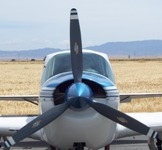 |
Columbia
Fly-In 2007 |
 |
|
Best time of the year to go? |
Spring but this is a year
round destination. |
|
Flight time in a Super Viking from KAJO? |
2.0 |
|
Food on the airport? |
3/4 mile walk to town. |
|
Fuel on airport? |
Yes |
|
Comments about arriving and departing |
Watch for traffic on the
crossing runways. No departures from runway 11 |
Rate this trip
10 being best, 5 being average. |
9.0 Beautiful country, fun
location for the spouse. I'd give it a 10 but the walk to
town is about a mile. |
 |
2007 Bellanca-Champion
Club Fly-In |
 |
Columbia is a former
California Gold Rush boom town that
lives on as a state-preserved historic park and a
National Historic Landmark that
preserves the original, gold-rush-town flavor of the town, once
dubbed the "Gem of the Southern Mines." Founded in
1850 by
Mexican
gold
miners, it is in
Tuolumne County,
California,
United States. Although only about
2,000 people now live in this region near
Sonora, California, at its height
it was California's second-largest city. It was even considered
briefly as a site for the state capitol of
California. In 1854 the bulk of the
town burned down and was re-built with brick and iron structures
that survive to this day. Columbia's main street, part of the
Columbia State Historic Park, is closed to automobile traffic but
open to horses and carriages, as well as pedestrians.
Within weeks of the discovery of gold in the
vicinity of Columbia, thousands of miners arrived and the population
climbed to 5,000. By
1852, there were 8 hotels, 4 banks,
17 general stores, 2 firehouses, 2 bookstores, 1 newspaper, 3
churches, and numerous gambling and drinking establishments. In
1854, Columbia's first fire
destroyed 6 city blocks. The town was rebuilt using brick and iron
materials. In
1857, another fire burned down
nearly everything else, except the brick buildings.
The Columbia
school house was built in
1860, renovated in
1872, and finally closed in
1937. In
1947, it was purchased by the state
of California for $1 and incorporated into the state-historic park.
Between
1850 and the early
1900s, $150 million in gold was
removed from the surrounding hills. By
1860, the gold mined in Columbia
was diminishing rapidly. The only land left to mine was in the city
itself. Miners dug under buildings and tore down houses to get at
the gold beneath the city. Columbia never became a
ghost town. In
1945, California created
Columbia State Historic Park from
the remains of the historical buildings of the city.
 |
Pictures
from the Fly-In! |
 |
 |
Last year we were told we
had too many airplane pictures and not enough people
pictures. I have no idea who many of these people are but
here goes. If you can help me match faces to names please
give me the photo ID number and the names. |
 |
Rod ? |
 |
3 |
 |
4 |
 |
5 |
 |
John Christensen |
 |
?, Sandra Hendrickson,
Richard Hendrickson, ? |
 |
?, John Sulley, Jim Spee |
 |
John Sulley, ? |
 |
Allen Hartstine |
 |
11 |
 |
Susan Gardner |
 |
Ron & Charlotte Taylor |
 |
14 |
 |
John Armanino & Ozzie Levi |
 |
16 |
 |
Bruce Barton |
 |
Dan Cullman & Bill Archibald
next to Larry Bell's Cruisair. |
 |
19 |
 |
Brian Torrey, ? |
 |
Joy Adams |
 |
?, ?, Dan Cullman, Larry
Loewenkron |
 |
23 |
 |
Chuck Sandford |
 |
?, Bob Szego, ? |
 |
Steve Henderson, George
Butts |
 |
Jim Spee, Ron Taylor |
 |
George Craig, Jim Spee |
 |
George Butts |
 |
Larry Bell, Jim Spee |
 |
George Butts |
 |
Randy Smith |
 |
Dan Torrey & Ozzie Levi |
 |
34 |
 |
35 |
 |
36 |
 |
Ozzie Levi's N6504N a 180
hp 14-13-2 |
 |
38 |
 |
39 |
 |
40 |
 |
41 |
 |
42 |
 |
43 |
 |
44 |
 |
45 |
 |
46 |
|
 |
|

